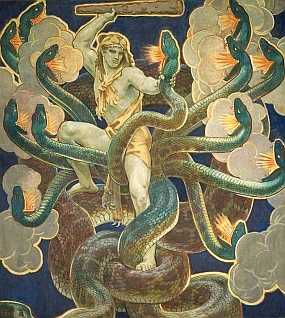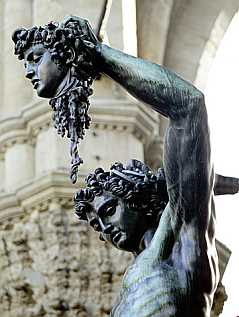Entering the homestretch of this series on myths believed about the American Church by those outside it, it's hard to avoid the cruel fact that several of these myths aren't myths. At one point, they may not have had one shred of truth to them at all, but something's happened to the Western Church—a very bad something. Sadly for us, those people who hold no pretenses to following Christ have noticed, yet we haven't.
The myths:
- Christians are more judgmental than non-Christians.
- Christians are stingier than non-Christians.
- Christians are more intolerant of other people than non-Christians.
- Christians are more short-sighted than non-Christians.
- Christians don't know how to have fun.
- Christians despise intellectuals more than non-Christians do.
- Christians prefer kitsch over important art.
- Christian subculture mimics the world rather than creating anything lasting.
- Companies run by Christians are as unethical as secular companies, and perhaps more so.
- Christianity causes more problems in the world than any other religion.
Today, we'll look at the final two.
9. Companies run by Christians are as unethical as secular companies, and perhaps more so
One of the most damning newspaper articles I've read in my life arrived in The Wall Street Journal shortly after the Enron and Worldcom scandals rocked the business world. In that article, the author took an in-depth look at the religious backgrounds of all the principal players in all the scandals. In nearly every case, those leaders were Evangelicals deeply involved in their churches as elders, teachers, deacons, and more.
I read that article about five times, attempting to find some way to reject what I was reading, but the truth shouted from the page.
My own personal odyssey dealing with Christian businesspeople is about as bad. When I look back on all the times I hired self-professed Christian professionals to help me resolve a problem, the number of times I got stiffed—and grossly, too, I might add—far, far, far outweighed the number of times the same happened with folks who made no pretenses to being Christians. Like 10:1.
So when I need an electrician to wire my house correctly so that the resulting "fix" doesn't burn it down, an ICHTHUS plastered on a Yellow Pages ad is my sign to hire someone else.
I hate saying that. As a Christian businessman myself, I would go sleepless for months if I knew I didn't turn in my best work. I'm a representative of Jesus Christ. My word and my work mean something deeper than putting food on the table. Doing outstanding work on every job I take is more than just the norm; it's my worship!
Why, then, do so many Christian businesspeople do such shoddy work—and under the guise of Christianity, too? Don't they know that's an anti-witness?  That kind of carelessness may be the foot that stomps out the Holy Spirit, not only in the life of the businessperson, but in his or her client's life, as well.
That kind of carelessness may be the foot that stomps out the Holy Spirit, not only in the life of the businessperson, but in his or her client's life, as well.
Why does this happen? I think it may have something to do with a hyperinflated and mind-bogglingly poor notion of what grace entails. Some Christians must cover their atrocious work ethic with such a thick lacquer of "grace" that they convince themselves it will hide all the flaws. Or they're nothing more than cultural Christians, reflecting no true inner conversion, bereft of the Holy Spirit who would never let them rest for doing such poor work in the name of Christ. I have no other explanation.
At one time in history, Christians could be counted on to provide the best of every service and manufactured product available. I can't muster the historical proof to say that we're far worse now than then, but doesn't it seem like it? Sure, a real mythbuster would have the proof, but all I have is a lopsided series of encounters with Christian businesses that weighs heavily in favor of a negative assessment. That doesn't mean that millions of good Christians who would never lie, cheat, or steal from a client don't exist. But whatever the case, the scoundrels are making it tough on all of us.
So while Hebrew National Hot Dogs claims to answer to "a higher Authority," we Messiah-worshipers better do more than just answer.
Assessment: Plausible, and very likely Confirmed.
***
10. Christianity causes more problems in the world than any other religion
Let me make this simple: Bull.
If anything, the heritage of the Christian Church since its founding proves a history of God using believers to fashion every good we enjoy today. Anyone who believes that Christianity is more a problem than a solution long ago turned off the brain cells.
If no Church of Jesus Christ graced this planet, we would kiss goodbye…
…the majority of the world's greatest art, music, and literature.
…large portions of philosophy, science, and invention.
…nearly all charitable organizations that reach out to the least of these.
…virtually all hospitals and medical centers in the world.
…every concept of personal freedom in government.
…the hope of rescue of oppressed people everywhere.
In fact, I would guess that a world with no Church would be so hopelessly grim by now that a traveler through such an alternate Earth, if not already a Christian, would convert on the spot after returning to his Church-filled reality. And that's true of no other religion or thought system.
For this reason, it's imperative that we Christians assess where we are today and ask if we're still making that kind of difference. If we're not on the forefront in every fruitful endeavor that Mankind enjoys, then we've failed to live as the Lord's fully redeemed people.
Our ancestors understood what Christ bought them by His blood, and they ran with that opportunity. They understood what it meant to live like wise Daniel did among the worldly, that it was more than just being pious. It meant learning! It meant expanding the horizons of what is known and what can be. Those wise men from the East called by God to visit the infant Jesus were the direct result of a godly man like Daniel who saw that serving God wasn't just a set of religious rituals separated from the whole of life.
Those Christians before us got it. Their devotion spawned countless benefits to us in every part of our lives. We can't drop the baton. To those who have been given much, much has been required.
Assessment: Couldn't be more Busted!
***
In the end, every single Christian in America should be a mythbuster. Too many of the myths held by unbelievers about Christianity today are shockingly closer to the truth than we care to admit. We can't continue to reinforce those myths.
If our passion for Christ is outweighed by our longing for entertainment, then we shouldn't call ourselves Christians. I'm afraid that in too many cases we're more concerned with our Tivo programming than reversing the mindset of unbelievers about the Church, and Jesus Christ, in particular. By living such worldly, meaningless lives, we only drive the lost away from their only hope.
Those Christians who gave their best to give us the science and arts we enjoy today took risks and God rewarded them. Many sinned boldly, yet loved God more boldly still. That kind of baldfaced living under grace seems foreign to us today. The modern American Church shies away from wrestling with angels. While some small-minded Christians point with pride to the fact they're not limping, it's also why so few of them go on to have their names listed among the heroes and patriarchs of the Faith. And it's why there's so little greatness in the American Church of the 21st century.
Christian, live in such a way that no myth hatched by the world applies to you.
Have a great weekend.
Entries in this series:
- Busting Myths About Christianity
- Busting Myths About Christianity: Assessing Myths 1-3
- Busting Myths About Christianity: Assessing Myths 4-6
- Busting Myths About Christianity: Assessing Myths 7-8
- Busting Myths About Christianity: Assessing Myths 9-10
{Image: Perseus slaying the Minotaur}

 It is one thing to live for the day, but quite another to live for the day so eternity is richer.
It is one thing to live for the day, but quite another to live for the day so eternity is richer. Last week, I
Last week, I